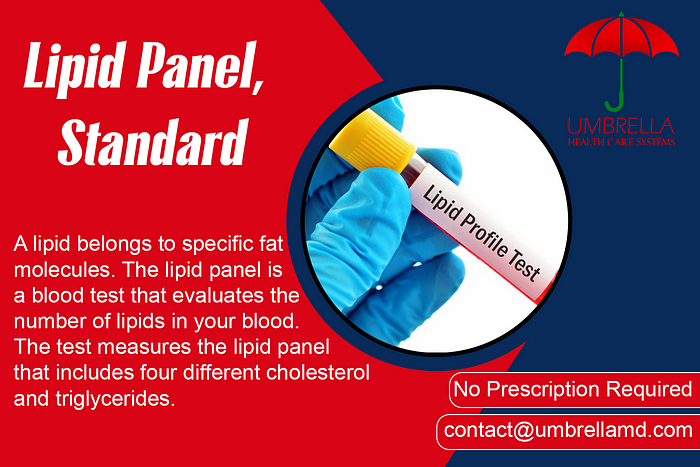Lipid Panel, Standard

Lipid Panel, Standard
Other names
Lipid profile, Lipid test, Cholesterol panel, Coronary risk panel, Fasting lipid panel, Non-fasting lipid panel
What is a lipid panel test?
A lipid belongs to specific fat molecules. The lipid panel is a blood test that evaluates the number of lipids in your blood. The test measures the lipid panel that includes four different cholesterol and triglycerides. You may lead to cardiovascular problems like heart disease, heart attack, and stroke if you have large quantities of lipids in your blood. It is due to the deposition of lipids in your arteries and blood vessels.
What are the tests included in a lipid panel?
The test determines five types of lipids from a sample of blood, such as
- Total Cholesterol — It defines the overall level of cholesterol in your blood. It includes LDC-C, VLDL-C, and HDL-C.
- Low-density lipoprotein (LDL) cholesterol — A type of bad cholesterol. It deposits in your arteries and results in cardiovascular disease.
- Very Low-density lipoprotein (VLDL) cholesterol — This lipid is present in the blood in very few amounts during the fasting blood sample. The abnormal metabolism of lipids indicates the high value of this cholesterol in your blood.
- High-density lipoprotein (HDL) cholesterol — A type of good cholesterol. It reduces the addition of LDL in your blood vessels.
- Triglycerides — A type of fat that comes from food. The higher value of it leads to heart-related disease and pancreas inflammation.
When do I need a lipid panel blood test?
Your healthcare provider examines the conditions of the cardiovascular system by checking the cholesterol level in your blood. Your provider may suggest more lipid panel tests if you have more chances of cardiovascular disease. Following are the possible reasons for cardiovascular disease that include
- For people aged above 45
- Being overweight
- Having high cholesterol levels already
- Having diabetes
- Smoking
- Lack of physical activity
- Having high blood pressure
Sometimes the provider may also use the lipid panel for specific health conditions, such as chronic kidney disease, pancreatitis, and hypothyroidism.
What happens during the test?
Your healthcare provider collects a blood sample from your veins. In general, the test takes at least 5–10 min.
Is fasting required for a lipid panel?
Your doctor recommends you keep fast for 10 to 12 hours before the test. You can only drink water. In some conditions, fasting is not necessary for the test. You have to follow the instructions provided to you by your provider.
What are the normal results for a lipid panel?
The results of the lipid panel for each of the four tests are:
Total cholesterol — Its value lie below 200 mg/dL
High-density lipoprotein (HDL) cholesterol — Their value lies above 60 mg/dL
High-density lipoprotein (HDL) cholesterol — Their value below 100 mg/dL and 70 mg/dL for those who have diabetes)
Triglycerides — Their value lie below 150 mg/dL
The higher values of total cholesterol, LDL, and triglycerides and lower values of HDL as compared to normal may lead to the risk for cardiovascular disease.
Visit umbrellamd to place the order for the test. Umbrella Health Care Systems is an online platform that helps you to observe health conditions. You can book a lab test without having a prescription. Besides, you can make an appointment with the doctor. It is a simple and efficient way to solve your health problems. We care for you. You can register here to get the details of more lab tests and medical imaging.
clik now: https://www.umbrellamd.com/
